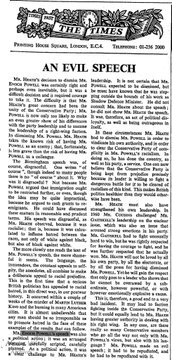The environment leading up to the [Brexit] referendum, the environment during the referendum, and the environment after the referendum has made racial and ethnic minorities more vulnerable to racial discrimination and intolerance.....and:
Many with whom I consulted highlighted the growth in volume and acceptability of xenophobic discourses on migration, and on foreign nationals including refugees in social and print media.
It would be wrong to dismiss the entire Brexit movement as xenophobic; I know a number of Brexiters who are certainly not xenophobic and voted against the EU for reasons such as its institutional failings or for its support for globalisation. So there are two half-decent reasons to vote Leave, even if in the end I disagree with them. Ian Dunt analyses the left-wing 'Lexit' movement here. Some on the left see the EU as a barrier to certain left wing aims, but I agree with this assessment from Dunt:
The EU is basically a social democrat project, based along German or Scandinavian lines. That's probably too right-wing for some people, and it's certainly too left wing for others. But it has a lot of space there for a wide range of political arrangements, covering the vast majority of political views in the UK. It doesn't always get the relationship right between abiding by EU rules and workers' rights, but you have to be a very stern observer to conclude from these fairly limited problems that we should take the massive risk of leaving the EU altogether, especially under such a right wing government. But still, we shouldn't write off left wing criticisms of the EU. Many of them are perfectly valid. Remainers would do well to address them, rather than dismiss them.
I doubt there are many xenophobes amongst the Lexiteers.
However, I think it’s fair to say that xenophobes are more likely to have voted Brexit. Why do I think this is fair to say? Well, more than one survey has concluded that Brexit is strongly linked to xenophobia. Furthermore, more Brexit voters self report as racist.
The Institute of Race Relations said “‘Brexit means Brexit’ is already being translated for BAME and migrant communities into ‘Brexit means racism’ – not just on the ground but also in the repressive proposals already emanating from politicians and government departments in October 2016”.
Now, to be fair, the statistics aren’t completely clear; analysis of Yougov’s surveys for the Campaign Against Antisemitism in 2015 and 2017 shows a reduction in anti-semitic attitudes in that period (and, by the way, show a reduction in antisemitism amongst Labour voters, pace the recent accounts of antisemitism in that party).
Nevertheless, the weight of the evidence suggests a link between the Brexit vote and xenophobia, and at the very least existing xenophobes were more vocal about their xenophobia after Brexit.
And it comes to something when Jacob Rees Mogg effectively tweets that Enoch Powell’s famous speech was racist and gets a load of abuse for it from other right-wingers; click on this link and check out the abuse JRM gets for supporting his father's view that Enoch Powell's 'rivers of blood' speech was 'racialist':
If JRM is too moderate for some people, then the right wing really is heading in a bad direction!
Maybe the increase in reported xenophobia around the Brexit vote is just a temporary blip, and I am being too pessimistic; I certainly hope so.


